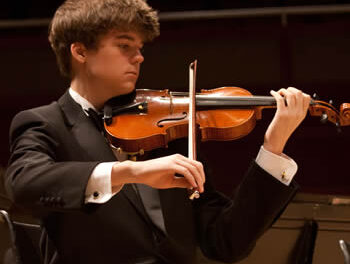The 2017 Brevard Music Festival includes a “festival within the festival” exploring the music of Kurt Weill. Assisted by the Kurt Weill Foundation for Music (created by Weill’s widow Lotte Lenya to preserve his legacy) and with support from the National Endowment for the Humanities, nine events will include a three-day symposium, a movie screening and seven concerts featuring the composer’s music. Weill had a fifteen-year career in his native Germany, with Bertold Brecht as his most noted collaborator, and then (after a brief interlude in Paris) another fifteen-year career in New York and Hollywood, with collaborators who included Ira Gershwin, Ogden Nash, and Maxwell Anderson.
The second event of the Kurt Weill Festival was Wednesday’s concert entitled “Weill & Schoenberg from Berlin to Hollywood.” The music underscored the very different temperaments of two German Jewish composers who fled Hitler’s Germany and ended up in Los Angeles: Kurt Weill (1900-1950) and Arnold Schoenberg (1874-1951). The performances were supplemented by commentary from cultural historian Joseph Horowitz, perhaps best known for his innovative “thematic” programming when he was executive director of the Brooklyn Philharmonic Orchestra at the Brooklyn Academy of Music from 1992-1997. He contributed to the thematic planning of this year’s Weill Festival.
Both in Germany and in the United States, Weill sought to write music with a social purpose. He was an ardent democratic socialist and believed that music must speak to the people. After resettling in America, he embraced his new country and its rough-hewn culture. By contrast, Schoenberg was always the German formalist, believing in abstract music and decrying American culture even while teaching American composers at UCLA and opposing the Nazi regime from his new home in Los Angeles. Both Weill and Schoenberg were profoundly affected by America’s entry into World War Two, but they reacted differently. Before intermission, we sampled Weill’s early music in Germany and his very American output after Pearl Harbor. After intermission, we were introduced to Schoenberg’s formal twelve-tone piano compositions and his reaction to Pearl Harbor.
William Sharp, baritone, began the concert singing “Berlin im licht” (1928) with Shane Schag as the collaborative pianist. Brevard faculty members Byron Tauchi, Jay Christy, Erika Eckert, and Susannah Chapman then performed the Two Movements for String Quartet that Weill wrote before a 1924 revision replaced them. The Allegro deciso movement had a brash theme characteristic of Weill’s tonal work, and the Andantino was simply charming.
Weill’s transition, first to Paris and then to New York, was illustrated by Lisa Vroman, soprano (accompanied by Schag) singing “J’attends un Navire” (from Marie Galante, 1934), coupled to “My Ship” (from Lady in the Dark, 1941). The same nautical metaphors occur in both songs, but the Parisian song was much darker while the American song was hopeful in outlook. Vroman delivered the works in a striking cabaret style, and I look forward to hearing her with full orchestra on July 12 singing more of Weill’s Broadway selections.
Weill’s reaction to the American entry into the war was to set several of Walt Whitman’s Civil War poems to music in 1942. “Beat! Beat! Drums!” and “Dirge for Two Veterans” were sung by Sharp in a convincing performance. The first half of the concert ended with student vocalists Matthew Queen, Franklin Mosely, and Amanda Palmeiro singing five selections from Huckleberry Finn, a musical with lyrics by Maxwell Anderson that was incomplete at the time of Weill’s death. Weill had taken out American citizenship in 1943, and his transition was complete. He was American.
Following intermission, Craig Nies of the piano faculty performed Schoenberg’s Six Little Piano Pieces, Op. 19, a work that can seem stark and spiritless if not played as well as Nies did. This was an example of unrelenting Schoenberg in 1919 Germany.
The audience had been encouraged by Joe Horowitz to take time at intermission to read the text of Lord Byron’s “Ode to Napoleon Buonaparte.” This was good advice, as Schoenberg’s reaction to the American entry into World War Two was to set Lord Byron’s tirade (which contrasts Napoleon the villain and George Washington the hero) into a piece for “reciter, string quartet and piano.” The resulting “Ode to Napoleon” is a dynamic, angry work that implicitly likens Hitler to Napoleon, and Franklin Delano Roosevelt to George Washington. The words flew by (that is why we read them at intermission), delivered brilliantly in Sprechgesang by Sharp as reciter, accompanied by faculty members Jason Posnock and Benjamin Sung, violins; Scott Rawls, viola; Alistair MacRae, cello; and Jihye Chang, piano.
The concert ended with an audience discussion with Horowitz, Sharp and Posnock. Everyone seemed convinced both Weill and Schoenberg were profoundly outraged at the Nazi regime, but their reactions to the American entry into the war were totally different – Weill became more American, Schoenberg remained resolutely German.The personal journeys of two of the twentieth Century’s groundbreaking composers profoundly diverged.











